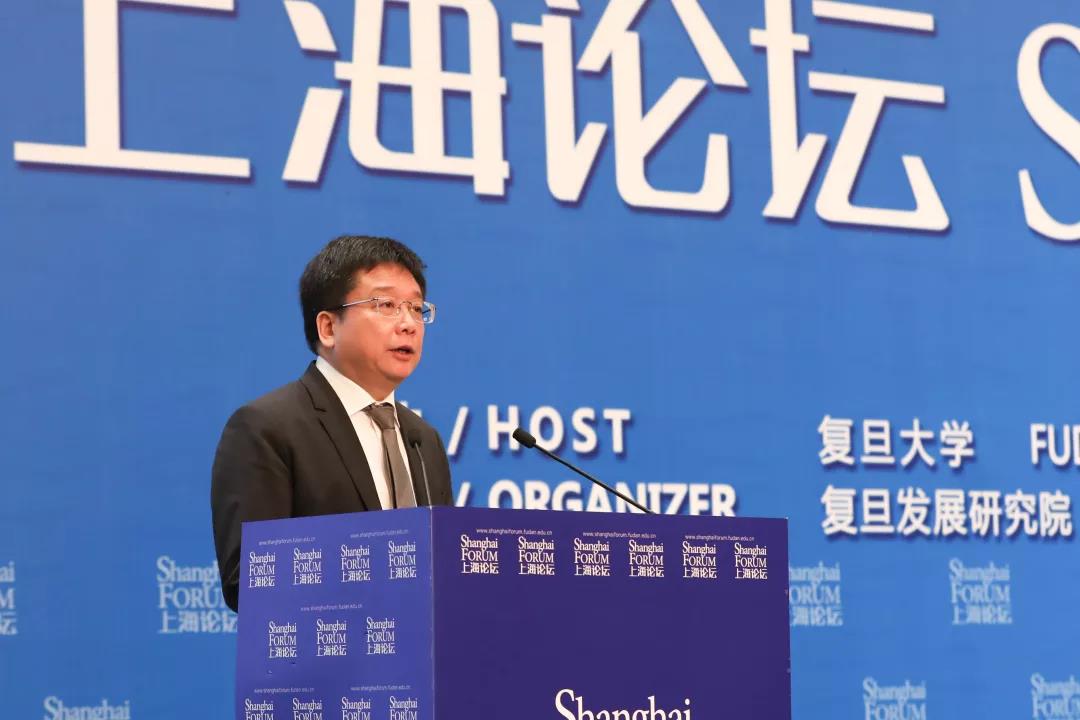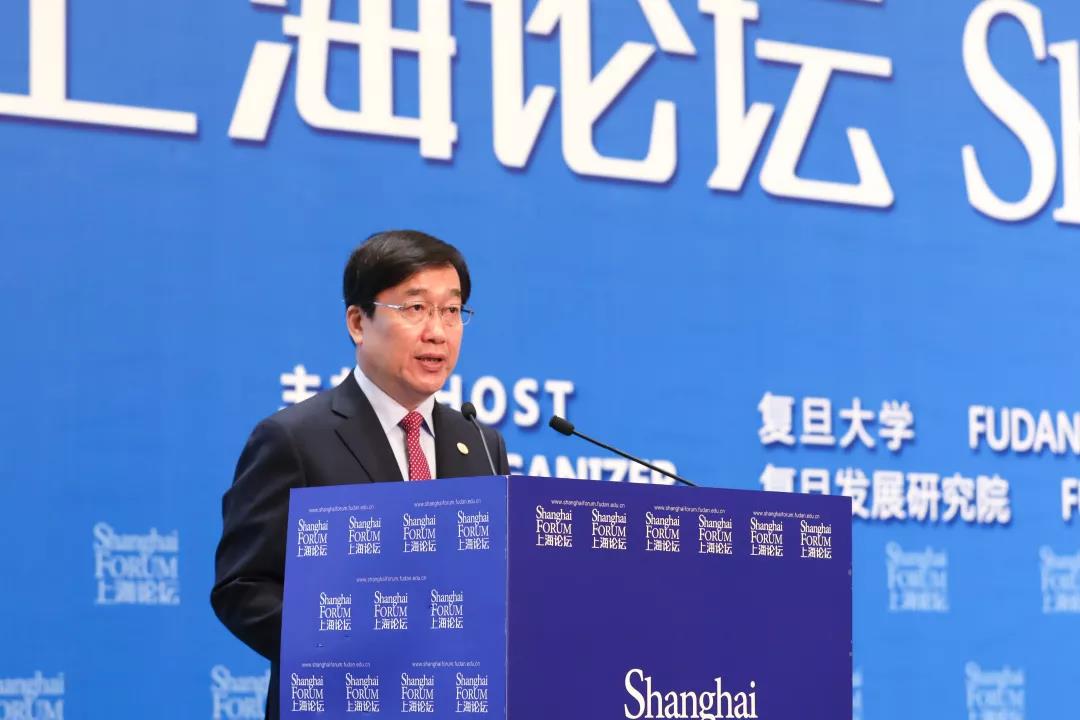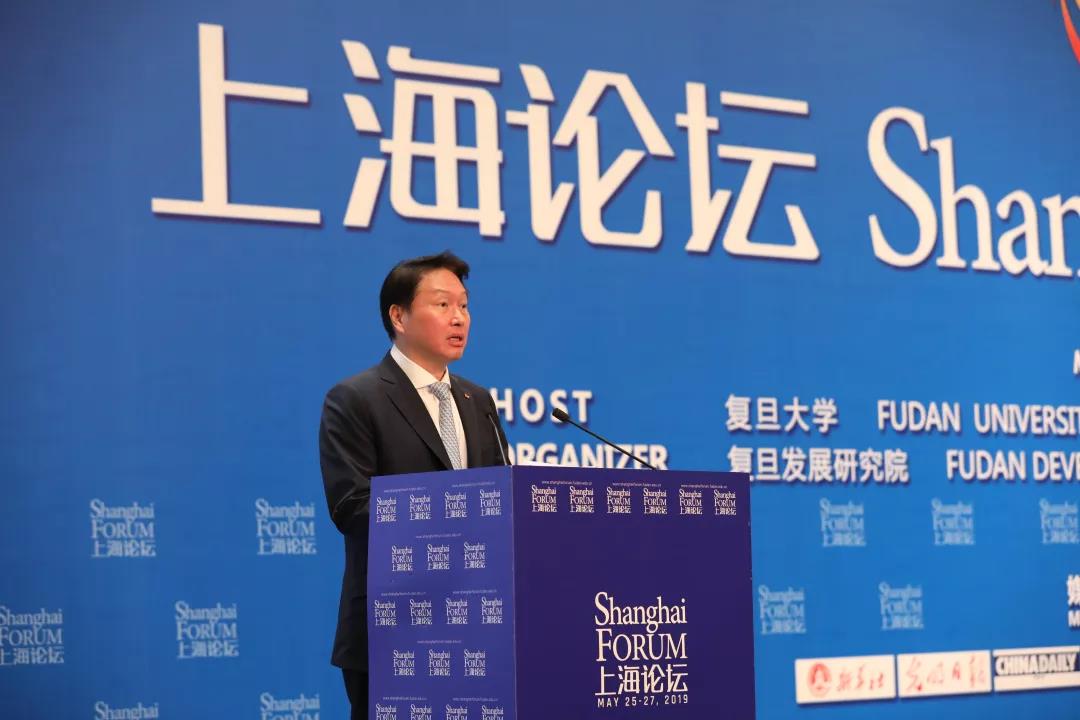Hello, welcome to visit Shanghai Forum
On May 25, Shanghai Forum 2019 was inaugurated at Shanghai International Convention Center. This year, the theme is Asia Amidst Global Reshuffling: Challenges, Developments, and New Paradigms. Over 700 guests and representatives from think tanks, universities, governments, corporates, media and other institutions at home and abroad attended the Forum.
Jiao Yang, Chairperson of Fudan University Council hosted the opening ceremony., Chen Qun, Vice Mayor of Shanghai, Xu Ningsheng, President of Fudan University, Chey Tae-Won, Chairman & CEO of SK Holdings in Korea, and Wang Jiarui, Vice Chairman of the 12th CPPCC National Committee delivered speeches respectively at the opening ceremony.

Jiao Yang, Chairperson of Fudan University Council hosted the opening ceremony

Chen Qun, Vice Mayor of Shanghai, Xu Ningsheng, President of Fudan University

Xu Ningsheng, President of Fudan University

Chey Tae-Won, Chairman & CEO of SK Holdings in Korea

Wang Jiarui, Vice Chairman of the 12th CPPCC National Committee
Park In-kook, President of Korea Foundation for Advanced Studies, Susan Shirk, research professor and Chair of the 21st Century China Center of UCSD, Wu Xinbo, Dean of Institute of International Studies, and Director of Center for American Studies and Vice Dean of Fudan Development Institute of Fudan University, Michael Spence, Vice-Chancellor of the University of Sydney, Paulo Portas, former Deputy Prime Minister of Portugal, and Zhu Wei, senior managing director and Chairman of Accenture Greater China delivered keynote speeches respectively.
Organizing Exchanges and Discussions on Global Hot Issues
Shanghai Forum 2019 will be held from May 25 to May 27. Under the theme of Asia Amidst Global Reshuffling: Challenges, Developments, and New Paradigms, the Forum includes four panels, namely “New Tech: Innovation and Social Development”, “New Order: Global Uncertainty and the World Restructuring”, “New Height: Shanghai towards an Excellent Global City” and “New Era: China in a New Round of Reform and Opening-up”, with altogether 30 roundtables. Delegates will have in-depth discussions over such global hot issues as the development of the Yangtze River Delta, fintech, artificial intelligence, reinventing the industries, watershed management, major-country relations and regional politics based on their own research and professional perspectives.
Building University Consortiums to Promote Fudan’s International Cooperation
In addition, the 1st Annual General Assembly of BRICS Universities League (BRICS UL) and the 2019 Fudan-Latin America University Consortium (FLAUC) Council Meeting will also be held during the Forum.
Delegates (Vice Chancellor level or above) from universities and research institutions of BRICS countries and leaders from over ten universities in China have been invited for discussion on such major issues as the constitution and governance structure of BRICS UL, the initiative of building a community with common health for people of the five BRICS countries. The academic roundtable on BRICS pragmatic cooperation and new order of global governance will also be conducted.
Established in October 2015, BRICS UL aims to become a platform for academic cooperation, comparative research, and international educational projects. Currently, 48 outstanding universities from the five BRICS countries have become members of the League. The Secretariat has now been rotated to Fudan University and run by the Centre for BRICS Studies of Fudan Development Institute (FDDI), which is founded in March 2012.
Initiated by Fudan University, FLAUC was established in 2017 by 12 universities in 6 countries, namely Argentina, Brazil, Chile, Columbia, Mexico and Peru. It aims to promote long-term cooperation through in-depth exchanges and high-end dialogues between China and Latin America including but not limited to academic conferences, faculty exchanges and research cooperation. The platform is expected to boost exchanges and strengthen mutual understanding between China and Latin America. The secretariat office of FLAUC is set at Fudan Development Institute.
Receiving Application to Global Think Tanks
This year, Shanghai Forum continues to serve as a platform to congregate global think tanks. The Forum welcomes global participation and has received applications from over 70 universities, think tanks, corporates, and media from 32 countries and regions. With the participation of many renowned think tanks and institutions, including Magyar Nemzeti Bank (MNB), the Brookings Institution, London School of Economics and Political Science (LSE), the University of Sydney (USYD), World Wildlife Fund (WWF), Times Higher Education (THE) and Accenture, Shanghai Forum can become a globalized and diversified platform where prestigious think tanks and scholars from all over the world can communicate and exchange ideas.
Releasing First Fudan Think-tank Report to Establish Reputation
The Fudan Think Tank Report will be released for the first time at the closing ceremony, helping expand its own brand influence. The seven-volume report will be divided into four sections, namely World, China, Shanghai and Future, covering such topics as the international situation, multilateral development banks, South China Sea Joint development, aging population, Guangdong-Hong Kong-Macao Greater Bay Area, integration of Yangtze River Delta, sustainable development and social common governance as well as China local government open data report.
Co-hosted by Fudan University and Korea Foundation for Advanced Studies, organized by Fudan Development Institute (FDDI), the Forum is a non-governmental and non-profit academic organization which holds an annual symposium each May in Shanghai. Spearheading innovation to promote human progress, national development and people's well-being, the Forum has already become one of the most prestigious international forums held in Shanghai, making contributions to the building of “Four Brands” of Shanghai. This year marks the 14th annual symposium of Shanghai Forum, which has attracted nearly 5000 speakers across the globe since its establishment. With its mission “Concentrate on Asia, Focus on Hot Issues, Congregate Elites, Promote Interactions, Enhance Cooperation and Seek Consensus”, Shanghai Forum aims to provide a platform for Chinese and foreign intellectuals from political, commercial and academic circles to communicate with each other and to contribute to regional development and national plans.

